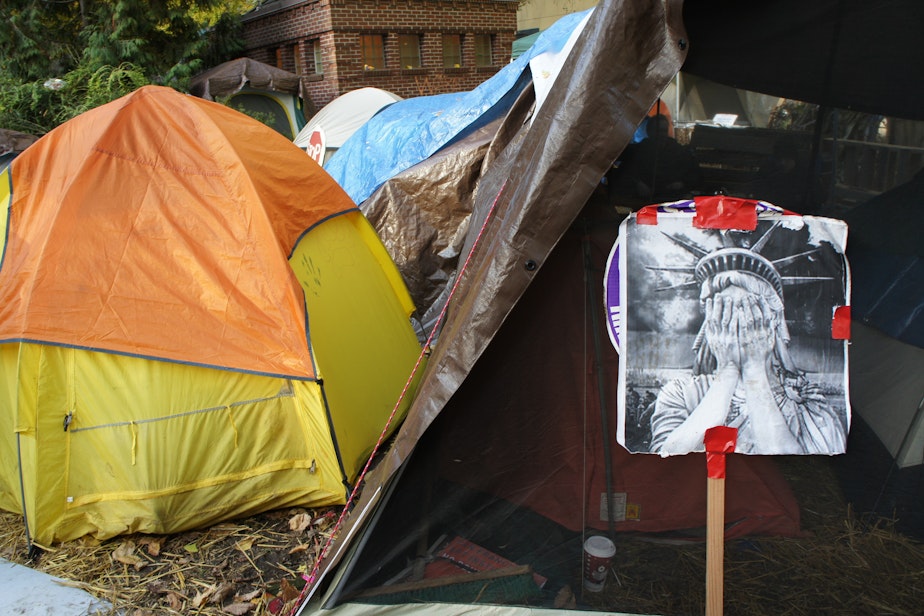Portland approved a plan to ban homeless camping. Now what?

Last night, the City Council in Portland, Oregon, approved a proposal to ban homeless camping. The plan would create city-sanctioned camping sites, then enforce a ban on people camping elsewhere, on sidewalks, in parks, and in other public areas.
Rebecca Ellis covers Portland City Hall for Oregon Public Broadcasting. She shared this update with KUOW’s Kim Malcolm.
This interview has been edited for clarity.
Kim Malcolm: The council debated the ban and related issues before voting yesterday. Tell us what happened.
Rebecca Ellis: Yesterday's council session was really a chance for the five City Council members to make changes to the plan. The biggest change to come out of it came from Commissioner Carmen Rubio. She put forward an amendment to the package calling for six camps with a maximum size of 250 people each. There have been a lot of homeless providers in the city saying camps with 500 people, the original plan, can get really unruly and unsafe. She got the council to get on board with a smaller cap size for these camps. Then the council took a vote and all five resolutions passed.
Just one council member voted against it. Who was it, and why did they vote against it?
That was Commissioner Jo Ann Hardesty. She voted against the most controversial resolution, to actually ban outdoor camping in Portland. She's known as the most progressive member of the council. Here's what she said as she cast her no note:
Sponsored
“Saying we will magically wave a wand in 18 months, and there will be no more street camping is not real. These resolutions contain no code changes, identify no funding or land, and have no agreements between jurisdictional partners.”
She also called the resolution inhumane, and said she could not bring herself to vote yes.
There's also some question about whether or not this plan is going to hold up in the courts.
The Oregon ACLU sent a legal notice to the City Council yesterday morning saying there’s a good chance the proposal violates a case called Martin v. Boise. It's the case that said municipalities cannot ban outdoor camping unless there are enough shelters for people to go to. The city's hoping to build enough shelters that they won't violate the case law.
The people that this would impact most directly, people living outdoors, had a separate meeting earlier this week with the mayor and Commissioner Dan Ryan, who proposed this plan. How did that go?
Sponsored
Most of them said they felt it was a terrible idea. They said they felt the resolutions would effectively criminalize homelessness and punish the city's poorest people who had nowhere else to go. They worried the plan would basically turn these camps into one big tent city and could quickly become unsafe with all of these people packed together. Some people even compare them to internment camps. A lot of people said, look, the idea of creating new shelter fine, that's great, but they need to be smaller, maybe 30 to 40 people. That obviously did not happen.
This package has now passed. How are supporters of this plan feeling about it at this point?
I think they're sort of cautiously optimistic. I think there are a lot of people that aren't very confident that the city can pull this off. As I mentioned, in order to ban camping, the city would actually need to build enough shelter to put everyone, and that is a really big if. But these supporters think it's a good goal. A lot of these people, many of them housed residents, say they are just at their wits' end with these tents blocking sidewalks, people having serious acute mental health crises in the middle of the street, no one helping them. They're hopeful this could actually be a good thing, directing people on the streets to places with services, and cleaning up the city at the same time.
So what's the timeline here? What comes next in this plan?
Even though all five resolutions passed, there is a lot that has to happen before this vision can become a reality. The plan is really expensive, and most of it is going to require funding from other agencies, Multnomah County, state legislators, the federal government. The city's budget office says the camping sites alone could cost between $3 million and $6.8 million. The cost of building the affordable housing units that the city wants to build as part of this plan could be $9.8 billion. Clearly, the city is not financing this alone.
Sponsored
They're also going to need to find land to actually build these large sites, which is really not going to be an easy task. There are a lot of Portland residents who are just not going to want a large homeless camp built next to them, no matter how well maintained it is. I'd say the next step is really the council trying to nail down the things they're going to need – money, support, land – to make this plan a reality.
Listen to the interview by clicking the play button above.



